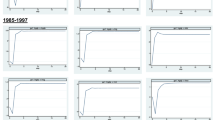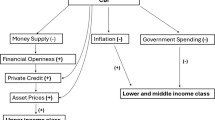Conclusions
Given the serious crisis in Asia and evidence of its spreading to other developing and transition countries, the attempt by German economic policymakers to achieve faster economic growth and higher employment almost exclusively by means of successes on export markets appears likely to fail sooner than had been expected by the DIW5. The significance of domestic demand has been systematically underestimated in recent years. With the help of extremely low pay settlements, the D-Mark was devalued in real terms; this promoted exports, but at the same time led to growth losses in private consumption and investment that more than offset the gains in exports. On top of this German fiscal policy—as documented in the following report in this issue—has weakened domestic demand and investment activity. This strategy might have worked if a symmetrically oriented monetary policy had reacted to the deflationary trend inherent in pay settlements and the fiscal-policy stance by swiftly and significantly reducing interest rates. This did not happen. It was therefore inevitable that the crisis in sales markets made its full effects felt on economic growth. More seriously still, if cost deflation in Germany is not brought to an end in the coming year by a return to productivity-oriented wage settlements, it will pose a major threat to the European Monetary Union.6 If Germany pursues a beggar-thyneighbour policy in a Europe without exchange rates, this can only result in deflation and a downward economic spiral.7
Similar content being viewed by others
References
German Bundesbank,Monthly Report, no. 5, 1998, p. 60.
Cf. Potential-oriented money supply policy and interest rate cycle, in:Economic Bulletin, no. 3, March 1994.
The German economy in the spring of 1998, in:Economic Bulletin, no. 6, June 1998.
Cf. Economic Trends 1997/98, in:Economic Bulletin, no. 8, August 1997, and Economic Trends 1998/99, in:Economic Bulletin, no. 8, August 1998
Rights and permissions
About this article
Cite this article
Flassbeck, H., Hahn, E. The global threat of deflation calls for swift interest rate cuts in Europe. Economic Bulletin 35, 3–8 (1998). https://doi.org/10.1007/BF02740831
Issue Date:
DOI: https://doi.org/10.1007/BF02740831




